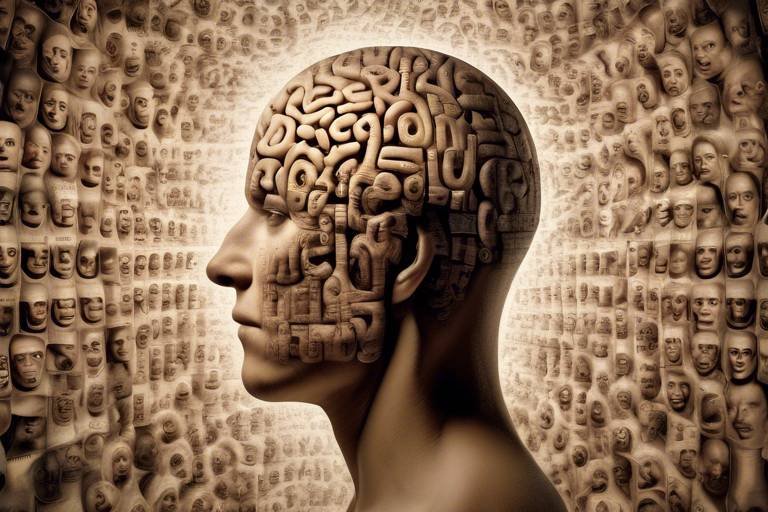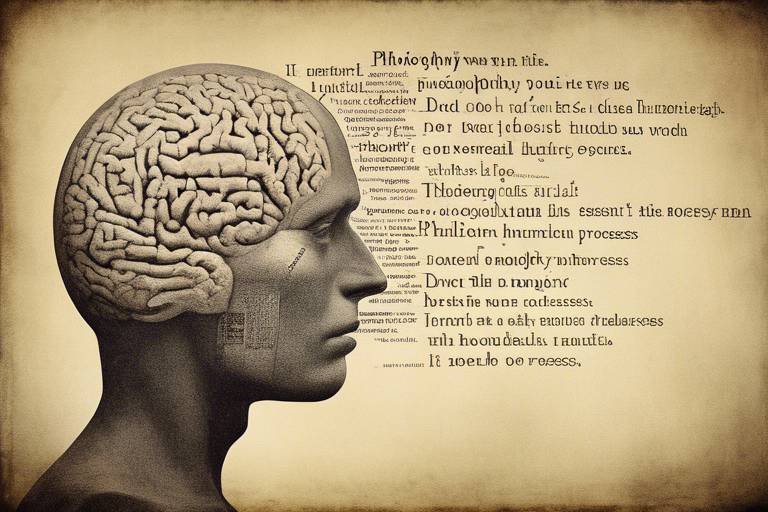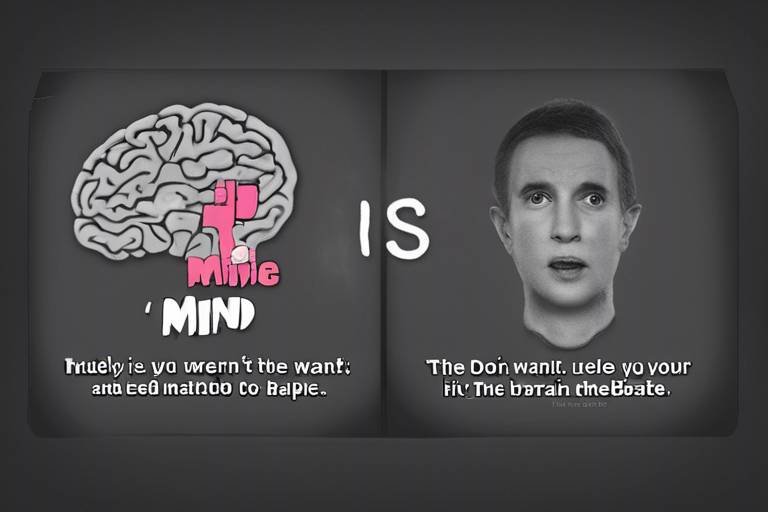The Role of Emotions in Conscious Experience
Emotions are not just fleeting feelings; they are powerful forces that shape our conscious experience in profound ways. Imagine walking into a room filled with laughter and joy—instantly, your mood lifts, and you feel a rush of happiness. Now, picture the opposite scenario: a tense argument unfolding nearby. Your heart races, and a cloud of anxiety descends upon you. These scenarios illustrate how emotions can color our perceptions and influence our interactions with the world around us.
Understanding the role of emotions in our conscious experience is crucial because it allows us to navigate our lives more effectively. Emotions act as a lens through which we interpret our surroundings, affecting everything from our decision-making to our relationships. They can enhance our experiences, making joyful moments more vivid, or they can distort our reality, leading us to react in ways we might later regret. By grasping how emotions shape our perceptions, we can learn to harness them for better mental well-being and emotional intelligence.
To illustrate this further, consider the following points about the impact of emotions on our conscious experience:
- Emotions Influence Perception: Our feelings can alter how we perceive events, objects, and even people. For instance, if you're feeling positive, you might see the world as a more welcoming place.
- Emotions Affect Decision-Making: Emotional states can lead to decisions that are either rational or impulsive. When we are happy, we may take more risks, while sadness might lead us to be more cautious.
- Emotions Shape Interactions: Our emotional states influence how we communicate and connect with others. A person who is emotionally aware can navigate social situations more adeptly.
In essence, emotions are integral to our conscious experience, acting as both a guide and a compass. They help us navigate the complexities of life, providing valuable information about our internal states and the external world. By enhancing our emotional awareness, we can improve our overall quality of life, making more informed decisions and fostering deeper connections with those around us.
Q: How do emotions affect our daily lives?
A: Emotions play a crucial role in shaping our perceptions, decisions, and interactions. They can influence everything from how we react to challenges to how we connect with others, making emotional awareness essential for navigating daily life.
Q: Can we control our emotions?
A: While we may not be able to control our initial emotional reactions, we can learn to regulate our responses through practices like mindfulness and emotional intelligence training.
Q: What is emotional intelligence?
A: Emotional intelligence is the ability to recognize, understand, and manage our emotions and the emotions of others. It plays a vital role in personal and professional relationships.

The Nature of Emotions
This article explores how emotions shape our conscious experiences, influencing our perceptions, decisions, and interactions. Understanding this relationship can enhance emotional intelligence and improve mental well-being.
Emotions are intricate psychological states that play a pivotal role in our daily lives. They are not just fleeting feelings; rather, they are complex interactions between our physiological responses, subjective experiences, and behavioral expressions. Think of emotions as the color palette of our mental landscape, where each hue represents a different feeling, from joy and excitement to sadness and anger. This rich tapestry of emotions helps us navigate our world, influencing our interactions and shaping our perceptions.
At their core, emotions can be categorized into basic types, such as happiness, sadness, fear, anger, surprise, and disgust. These fundamental emotions serve as the building blocks for more complex emotional experiences. For instance, the feeling of love may encompass joy, affection, and even a hint of anxiety, while grief might combine sadness, anger, and confusion. Understanding these basic emotions is essential for recognizing how they manifest in our lives.
One of the most fascinating aspects of emotions is their physiological component. When we experience an emotion, our body reacts in various ways—our heart rate may increase, we might sweat, or our muscles may tense up. This physical response is not just a byproduct; it’s a crucial part of how we experience emotions. For instance, when you feel fear, your body prepares to either fight or flee, a reaction that has roots in our evolutionary past. This connection between body and emotion is what makes feelings so powerful and often overwhelming.
Moreover, emotions are deeply intertwined with our subjective experiences. How we interpret and label our emotions can vary significantly from person to person. For example, one individual may feel exhilarated by a rollercoaster ride, while another may experience sheer terror. This difference in perception highlights the subjective nature of emotions—what feels thrilling to one may feel threatening to another. This subjectivity is also influenced by factors such as cultural background, personal experiences, and even biological predispositions.
In addition to these aspects, emotions are also expressed through our behavior. The way we communicate our feelings—through facial expressions, body language, and verbal cues—plays a vital role in how we connect with others. For instance, a smile can convey warmth and friendliness, while a frown might indicate disapproval or sadness. Understanding these expressive components can enhance our ability to empathize with others, fostering deeper connections.
To sum it up, emotions are not just simple reactions; they are complex, multi-faceted experiences that encompass physiological changes, subjective interpretations, and expressive behaviors. By recognizing the nature of emotions, we can better understand ourselves and the people around us, paving the way for improved emotional intelligence and healthier relationships.
- What are the basic types of emotions? The basic types include happiness, sadness, fear, anger, surprise, and disgust.
- How do emotions affect our decision-making? Emotions can significantly influence our choices, leading us to make decisions based on feelings rather than logic.
- Can we learn to manage our emotions? Yes, developing emotional intelligence can help individuals recognize and manage their emotions effectively.
- Why is emotional intelligence important? Emotional intelligence is crucial for building strong relationships, improving communication, and enhancing overall mental well-being.

Have you ever noticed how your mood can completely alter the way you view the world? It’s like wearing a pair of glasses tinted by your feelings. When you’re happy, everything seems brighter and more vibrant, while sadness can cast a shadow over even the sunniest days. This fascinating interplay between emotions and perception is a crucial aspect of our conscious experience. Our emotions not only color our perceptions but also shape our interpretations of events, people, and even ourselves.
To understand this relationship better, let’s consider some examples. Imagine you’re walking through a park on a sunny day. If you’re feeling joyful, you might notice the laughter of children, the beauty of blooming flowers, and the warmth of the sun on your skin. However, if you’re feeling anxious or sad, those same elements might fade into the background, overshadowed by your internal turmoil. This phenomenon occurs because our emotional state acts as a filter, influencing what we notice and how we interpret our surroundings.
Research has shown that emotions can enhance or distort our sensory experiences. For instance, a study found that individuals who were feeling anxious were more likely to perceive ambiguous stimuli as threatening. Conversely, those in a positive emotional state were more likely to interpret the same stimuli as benign. This emotional bias demonstrates that our feelings can significantly impact our reality, often leading us to see what we expect or fear rather than the objective truth.
Moreover, emotions can also affect our attention. When we experience strong feelings, we tend to focus on information that aligns with those emotions. For example, if you’re excited about an upcoming event, you might pay more attention to related details, such as the location and participants, while ignoring less relevant information. This selective attention can enhance our experience but can also lead to a skewed understanding of a situation.
In addition to shaping our perceptions, emotions also play a vital role in memory. Emotional experiences are often more memorable than neutral ones, making them easier to recall later. This is because emotions trigger the release of neurotransmitters in the brain, which strengthen the connections between neurons associated with those memories. The connection between emotions and memory can be illustrated in the following table:
| Emotion | Memory Impact |
|---|---|
| Joy | Enhances recall of positive experiences |
| Fear | Increases retention of threatening situations |
| Sadness | Can lead to ruminating over negative memories |
| Surprise | Creates strong, vivid memories of unexpected events |
Ultimately, understanding the connection between emotions and perception is essential for enhancing our emotional intelligence. By recognizing how our feelings influence our view of the world, we can learn to manage our emotions more effectively, leading to better decision-making and improved interactions with others. So the next time you find yourself feeling a certain way, take a moment to reflect on how that emotion might be shaping your perception of reality. Are you seeing things as they truly are, or is your emotional lens distorting your view?
- How do emotions affect our decision-making? Emotions can lead to both rational and irrational choices, depending on the context and intensity of the feelings involved.
- Can we control our emotional responses? Yes, through practices like mindfulness and emotional regulation, we can learn to manage our emotional reactions.
- Why are emotional experiences more memorable? Emotional experiences activate brain regions that enhance memory consolidation, making them easier to recall later.

Emotions are like vibrant colors that paint the canvas of our memories. When we experience something emotionally charged, it tends to stick with us much longer than a mundane event. Have you ever noticed how a particular song can transport you back to a specific moment in your life, flooding your mind with memories? This phenomenon is largely due to the interplay between emotions and memory, which is a fascinating area of study in psychology.
When we encounter an event that elicits a strong emotional response—be it joy, sadness, fear, or anger—our brains encode that experience more vividly. This is because the amygdala, a small almond-shaped structure in the brain, plays a crucial role in processing emotions and is closely linked to the hippocampus, the area responsible for forming new memories. The stronger the emotion, the more likely we are to remember the details of that event. For instance, a traumatic experience may be etched in our minds with crystal clarity, while a neutral day at work might fade away into obscurity.
Interestingly, emotional memories can be categorized into two types: positive and negative. Positive emotional memories, such as a wedding day or a graduation ceremony, often bring feelings of happiness and nostalgia. In contrast, negative emotional memories, like the loss of a loved one or a painful breakup, can evoke feelings of grief or regret. Both types are important because they shape our identities and influence our behaviors moving forward.
Moreover, emotional memories can also affect our future decisions and interactions. For example, if you've had a negative experience with a dog in your childhood, you might approach dogs with caution or fear as an adult. This is a classic case of how past emotional experiences can condition our responses to similar situations in the future. This phenomenon is often referred to as emotional conditioning, where our brains create associations between certain stimuli and emotional responses.
To illustrate this point, consider the following table that summarizes the impact of emotional memory:
| Type of Emotional Memory | Characteristics | Impact on Future Behavior |
|---|---|---|
| Positive | Joyful, uplifting, nostalgic | Encourages similar experiences, fosters optimism |
| Negative | Fearful, sad, regretful | Leads to avoidance, promotes caution |
In conclusion, emotional memory is a powerful aspect of our conscious experience. It shapes not only how we remember the past but also how we navigate the future. By understanding the intricate relationship between emotions and memory, we can better appreciate the profound impact our feelings have on our lives. So, the next time you find yourself reminiscing about a moment, take a moment to consider the emotions tied to that memory. It might just reveal something new about yourself!
- What is emotional memory? Emotional memory refers to the way our emotions influence the encoding and recall of memories, often making emotionally charged events more memorable.
- How do emotions affect our memories? Emotions enhance our ability to remember experiences by making them more vivid and easier to recall, thanks to the interplay between the amygdala and hippocampus.
- Can emotional memories be changed? While our emotional memories are often strong, they can be reshaped through new experiences, therapy, and conscious reflection.

The amygdala, a small almond-shaped cluster of nuclei located deep within the temporal lobe of the brain, plays a crucial role in processing emotions. Imagine it as the brain's emotional alarm system, constantly scanning for threats and opportunities. When we encounter a stimulus—be it a scary face or a delicious meal—the amygdala springs into action, triggering our emotional responses. This immediate reaction is essential for survival, allowing us to respond quickly to potential dangers.
But the amygdala's influence extends far beyond just fear responses. It is also integral to the formation of emotional memories. When we experience something emotionally charged, the amygdala helps encode that experience, making it easier for us to recall it later. This is why we often remember moments of joy or sadness more vividly than mundane experiences. The interplay between the amygdala and other brain regions, such as the hippocampus, creates a rich tapestry of memories that are colored by our emotions.
Furthermore, the amygdala is involved in the regulation of emotional responses. It communicates with various parts of the brain, including the prefrontal cortex, which is responsible for higher-order thinking and decision-making. This connection is vital; it allows us to assess our emotional reactions and decide how to respond appropriately. For instance, if you feel a surge of anger, the amygdala alerts you, but the prefrontal cortex can help you evaluate whether acting on that anger is the best choice. This collaboration between emotional and rational processing is what makes us uniquely human.
In summary, the amygdala is more than just an emotion center; it is a key player in our emotional landscape. It helps us navigate through life's challenges and joys, shaping our memories and influencing our decisions. Understanding its role can enhance our emotional intelligence, allowing us to manage our feelings more effectively and improve our interactions with others.
- What is the primary function of the amygdala? The amygdala primarily processes emotions and is crucial for emotional memory formation.
- How does the amygdala influence decision-making? The amygdala triggers emotional responses that can impact our decision-making, often in conjunction with the prefrontal cortex.
- Can the amygdala be trained? Yes, through practices like mindfulness and emotional regulation strategies, we can learn to manage our emotional responses more effectively.
- What happens if the amygdala is damaged? Damage to the amygdala can lead to difficulties in recognizing emotions, impaired emotional memory, and challenges in forming social connections.

Emotional conditioning is a fascinating psychological phenomenon that highlights how our past experiences shape our present emotional responses. Imagine walking into a room and suddenly feeling a wave of anxiety wash over you, even if there’s no apparent threat. This reaction often stems from previous experiences that have created associations in our minds. For instance, if you had a negative experience in a similar setting, your brain might trigger an emotional response based on that memory, even if the current situation is entirely different. This is the essence of emotional conditioning—it’s like a mental shortcut that your brain takes, often without you even realizing it.
At its core, emotional conditioning involves the process of learning through associations. It’s similar to how Pavlov’s dogs learned to salivate at the sound of a bell because they associated it with food. In human terms, this could mean developing a fear of dogs after being bitten as a child, leading to a conditioned emotional response whenever you see a dog, regardless of its demeanor. This can create a cycle where the emotional response reinforces the fear, making it difficult to break free from these conditioned reactions.
Several factors contribute to emotional conditioning, including:
- Repetition: The more frequently an emotional experience occurs in conjunction with a particular stimulus, the stronger the association becomes.
- Intensity: Highly emotional events, whether positive or negative, tend to create stronger memories and associations.
- Context: The environment in which the emotional experience occurs can also influence how we react in similar situations later on.
Understanding emotional conditioning is crucial for personal growth and emotional regulation. By recognizing the origins of our emotional responses, we can begin to challenge and reframe these associations. For example, if you know that your fear of public speaking stems from a past experience, you can consciously work to create new, positive associations with speaking in front of others. Techniques such as cognitive-behavioral therapy (CBT) can be incredibly effective in helping individuals recondition their emotional responses, allowing them to respond more adaptively in various situations.
In summary, emotional conditioning is a powerful force in shaping our emotional landscape. By becoming aware of how our past experiences influence our present feelings, we can take proactive steps to manage our emotional responses, leading to healthier interactions and improved mental well-being.
What is emotional conditioning?
Emotional conditioning is the process through which our past experiences forge associations that influence our current emotional responses. It can lead to automatic reactions based on previous events.
How does emotional conditioning affect our daily lives?
Emotional conditioning can significantly impact how we respond to various situations. For instance, someone who has had a traumatic experience might feel anxious in similar contexts, even if there is no real threat.
Can emotional conditioning be changed?
Yes! Through techniques like cognitive-behavioral therapy and mindfulness, individuals can learn to recognize and reframe their conditioned emotional responses, leading to healthier emotional patterns.
Are there examples of emotional conditioning?
Common examples include developing fears after traumatic events, such as a fear of flying after a turbulent flight, or feeling joy when hearing a specific song that reminds you of a happy memory.

When it comes to making decisions, we often like to think that we’re being completely rational and logical. However, the truth is far more complex. Our emotions play a crucial role in shaping the choices we make, often leading us down paths we might not have chosen if we were solely relying on logic. Imagine standing in a candy store, trying to choose between a chocolate bar and a bag of gummy bears. If you’re feeling nostalgic about your childhood, that chocolate bar might suddenly seem like the better option, even if the gummies are technically healthier. This is just one small example of how emotions can sway our decisions.
Research shows that emotions can serve as a double-edged sword in decision-making. On one hand, they can enhance our ability to make quick decisions, especially in high-pressure situations. For instance, when faced with an emergency, our instinctual emotional responses can guide us to act swiftly and effectively. On the other hand, emotions can cloud our judgment and lead to poor choices. Think about a time when you were angry or upset—did you make the best decisions during that period? Probably not!
One fascinating aspect of how emotions influence decisions is the concept of affect heuristic. This psychological phenomenon suggests that people often rely on their current emotional state to evaluate risks and benefits. For example, if you’re in a good mood, you might underestimate the risks of a big investment. Conversely, if you’re feeling anxious, you might overestimate potential dangers. This interplay between emotions and decision-making highlights the importance of being aware of our feelings and how they can affect our choices.
Moreover, the context in which a decision is made can significantly influence our emotional responses. For instance, making a choice in a supportive environment can lead to more positive emotions, while a high-stress setting can amplify negative feelings. This means that not only do our emotions impact our decisions, but the surrounding circumstances can also shape our emotional landscape. Understanding this relationship can empower us to create environments that foster better decision-making.
To sum it up, emotions are not just fleeting feelings that come and go; they are powerful forces that influence our decisions in profound ways. Recognizing the role of emotions can help us become more mindful decision-makers. So, next time you face a choice, take a moment to reflect on how your feelings might be guiding you, and consider if they align with your long-term goals.
- How do emotions affect decision-making? Emotions can influence our perceptions of risks and benefits, leading to either quick, intuitive decisions or clouded judgments.
- Can I improve my decision-making skills? Yes! Being aware of your emotional state and the context of your decisions can help you make more informed choices.
- What is the affect heuristic? The affect heuristic is a mental shortcut where people rely on their emotions to make evaluations about risks and benefits.
- Are emotional decisions always bad? Not necessarily! Emotions can enhance decision-making in certain contexts, especially in high-pressure situations.

Emotional intelligence, often abbreviated as EI or EQ, is a fascinating concept that dives deep into the intricacies of human emotions. It’s not just about recognizing your feelings; it’s about understanding how those feelings affect your thoughts and behaviors. Imagine navigating through life with a compass that not only points north but also helps you understand the terrain around you. That’s what emotional intelligence does—it enhances your ability to interact with the world and the people in it.
At its core, emotional intelligence is the ability to recognize, understand, and manage emotions—both your own and those of others. This skill set can have a profound impact on various aspects of life, including personal relationships, workplace dynamics, and even mental health. Think of it as a toolkit for emotional navigation. When you can identify emotions, you can respond to them more effectively, leading to healthier interactions and better decision-making.
Why is emotional intelligence so important? For starters, it allows individuals to communicate more effectively. Imagine a scenario where two friends are in a heated argument. One friend, equipped with high emotional intelligence, can sense the rising tension and choose to address it calmly, perhaps by acknowledging the other’s feelings and steering the conversation toward a resolution. On the other hand, a lack of emotional awareness might lead to escalation and further conflict. This example illustrates how emotional intelligence can be a game-changer in both personal and professional settings.
Moreover, emotional intelligence is not a fixed trait; it can be developed and enhanced over time. Here are a few key components that contribute to building emotional intelligence:
- Self-awareness: Understanding your own emotions and how they affect your thoughts and behavior.
- Self-regulation: The ability to manage your emotions in healthy ways, such as controlling impulses and expressing emotions appropriately.
- Motivation: Harnessing emotions to pursue goals with energy and persistence.
- Empathy: The ability to understand and share the feelings of others, which is crucial for building strong relationships.
- Social skills: Proficiency in managing relationships and building networks, essential for effective communication.
These components work together to create a well-rounded emotional intelligence profile, enabling individuals to navigate complex social situations with ease. For instance, in a workplace setting, an employee with high emotional intelligence may excel in teamwork and leadership roles, as they can read the room, manage conflict, and inspire others.
In summary, emotional intelligence is a vital skill that shapes our interactions and overall well-being. By investing in the development of emotional intelligence, we not only improve our personal lives but also contribute positively to the environment around us. Whether you're looking to enhance your relationships or advance in your career, cultivating emotional intelligence can provide the tools necessary for success.
- What is emotional intelligence? Emotional intelligence is the ability to recognize, understand, and manage emotions in oneself and in others.
- Why is emotional intelligence important? It plays a crucial role in effective communication, relationship building, and decision-making.
- Can emotional intelligence be developed? Yes, emotional intelligence can be enhanced through practice and self-awareness.
- How does emotional intelligence impact relationships? High emotional intelligence fosters better understanding, communication, and conflict resolution in relationships.

Developing emotional intelligence (EI) is akin to nurturing a garden; it requires consistent effort, attention, and the right conditions to flourish. At its core, emotional intelligence is about recognizing, understanding, and managing our own emotions while also being attuned to the emotions of others. This dual focus can significantly enhance our personal and professional lives. But how do we cultivate this essential skill?
First and foremost, self-awareness is the foundation of emotional intelligence. It involves taking a step back and honestly assessing our emotions and the triggers behind them. This self-reflection can be achieved through practices like journaling or mindfulness meditation. By regularly checking in with ourselves, we can identify patterns in our emotional responses and gain insight into how they affect our behavior and interactions.
Next, self-regulation plays a crucial role in managing our emotions effectively. It's not just about controlling our feelings but also about channeling them positively. For instance, when faced with stress, instead of reacting impulsively, we can take a deep breath and respond thoughtfully. This ability to pause and reflect helps us avoid rash decisions that we might regret later. Techniques such as deep breathing, counting to ten, or even taking a short walk can aid in this process.
Another important aspect of developing emotional intelligence is motivation. This is about harnessing our emotions to drive us towards our goals. Passion and enthusiasm can be powerful motivators, but they need to be balanced with a realistic understanding of our capabilities and limitations. Setting small, achievable goals can help maintain our motivation and provide a sense of accomplishment along the way.
Empathy, the ability to understand and share the feelings of others, is a cornerstone of emotional intelligence. It allows us to connect with people on a deeper level and respond to their needs effectively. To foster empathy, we can practice active listening—truly paying attention to what others are saying without planning our response while they speak. This not only enhances our understanding but also builds trust and rapport in our relationships.
Lastly, social skills are vital for navigating the complexities of interpersonal relationships. These include effective communication, conflict resolution, and the ability to inspire and influence others. Engaging in group activities, participating in team projects, or even volunteering can enhance these skills. The more we interact with diverse groups of people, the better we become at understanding different perspectives and managing social dynamics.
In summary, developing emotional intelligence is a multifaceted journey that encompasses self-awareness, self-regulation, motivation, empathy, and social skills. As we invest in these areas, we not only improve our own emotional landscape but also enrich our interactions with others, leading to healthier relationships and a more fulfilling life.
- What is emotional intelligence? Emotional intelligence is the ability to recognize, understand, and manage our own emotions while also being aware of and influencing the emotions of others.
- Why is emotional intelligence important? High emotional intelligence can lead to better relationships, improved mental health, and enhanced decision-making skills.
- How can I improve my emotional intelligence? You can improve your emotional intelligence by practicing self-awareness, self-regulation, empathy, and enhancing your social skills through various interactions and experiences.

Emotional intelligence (EI) plays a pivotal role in shaping our relationships, both personal and professional. When we talk about EI, we're referring to our ability to recognize, understand, and manage our emotions and those of others. Imagine navigating a ship through stormy seas; without the right skills, it can easily capsize. Similarly, in relationships, a high level of emotional intelligence can help us weather the storms of misunderstandings and conflicts.
One of the most significant aspects of emotional intelligence is effective communication. When we are aware of our own emotions, we can express ourselves more clearly and constructively. For instance, if you're feeling upset about something your partner did, instead of exploding in anger, you can communicate your feelings calmly and assertively. This not only helps in resolving the issue but also prevents further emotional escalation. In contrast, a lack of emotional intelligence can lead to miscommunication, where emotions overshadow the message, causing confusion and resentment.
Furthermore, emotional intelligence enhances our ability to empathize with others. Empathy is the cornerstone of any healthy relationship. It allows us to put ourselves in someone else’s shoes and understand their feelings and perspectives. When we empathize with our friends, family, or colleagues, we create a safe space for open dialogue. This fosters trust and strengthens bonds, making it easier to navigate through conflicts. For example, if a friend is going through a tough time, being able to empathize can help you provide the support they need, rather than dismissing their feelings.
Additionally, emotional intelligence aids in conflict resolution. Conflicts are inevitable in any relationship, but how we handle them can make all the difference. With high emotional intelligence, individuals are more likely to approach conflicts with a level head, focusing on finding solutions rather than assigning blame. This proactive approach can transform potentially damaging arguments into opportunities for growth and understanding. It’s like turning a thorny bush into a blooming flower—what once seemed prickly can become beautiful with the right care.
To illustrate the impact of emotional intelligence on relationships, consider the following table that highlights key areas where EI makes a difference:
| Area | Impact of Emotional Intelligence |
|---|---|
| Communication | Clearer expression of thoughts and feelings |
| Empathy | Deeper understanding of others' emotions |
| Conflict Resolution | More constructive and less confrontational interactions |
| Trust | Stronger bonds and a sense of security |
In conclusion, the impact of emotional intelligence on relationships cannot be overstated. It equips us with the tools to communicate effectively, empathize deeply, and resolve conflicts amicably. Just as a skilled gardener nurtures plants to flourish, developing our emotional intelligence can help our relationships thrive. So, why not take the time to cultivate these skills? The rewards are not just personal; they ripple outwards, enhancing the connections we have with others and creating a more harmonious environment.
Frequently Asked Questions
- What is emotional intelligence? Emotional intelligence is the ability to recognize, understand, and manage our own emotions and the emotions of others.
- How can I improve my emotional intelligence? You can improve your emotional intelligence by practicing self-awareness, empathy, and effective communication.
- Why is emotional intelligence important in relationships? It helps in building trust, improving communication, and resolving conflicts more effectively.
- Can emotional intelligence be learned? Yes, emotional intelligence can be developed over time through practice and self-reflection.
Frequently Asked Questions
- What are emotions and why are they important?
Emotions are complex psychological states that involve physiological responses, subjective experiences, and expressive behaviors. They are crucial because they influence our perceptions, decisions, and interactions, shaping our overall conscious experience and well-being.
- How do emotions affect perception?
Emotions play a significant role in how we perceive the world. They can distort or enhance our sensory experiences, leading us to interpret reality in ways that align with our feelings. For instance, when we're happy, we might notice more positive aspects of our surroundings, while sadness can lead us to focus on the negative.
- What is emotional memory?
Emotional memory refers to the vivid recollection of experiences that are tied to strong emotions. These memories are often more easily recalled than neutral ones, influencing our future behaviors and decisions based on past emotional experiences.
- What role does the amygdala play in emotions?
The amygdala is a small, almond-shaped structure in the brain that is essential for processing emotions. It helps us respond to emotional stimuli and is involved in forming emotional memories, making it a key player in our emotional experiences.
- What is emotional conditioning?
Emotional conditioning is the process by which past experiences shape our emotional responses. Through this, we learn to associate certain stimuli with specific emotions, leading to conditioned reactions based on previous encounters.
- How do emotions influence decision-making?
Emotions can significantly impact our decision-making processes. They can lead us to make both rational and irrational choices, affecting various aspects of our lives. Understanding this influence is crucial for making more informed decisions.
- What is emotional intelligence?
Emotional intelligence is the ability to recognize, understand, and manage emotions in ourselves and others. It plays a vital role in personal and professional environments, enhancing relationships and promoting mental health.
- How can I develop my emotional intelligence?
Improving emotional intelligence involves enhancing self-awareness, self-regulation, motivation, empathy, and social skills. Strategies include reflecting on your emotions, practicing active listening, and seeking feedback from others to foster personal growth.
- How does emotional intelligence affect relationships?
High emotional intelligence contributes to healthier relationships by improving communication, facilitating conflict resolution, and enhancing overall relational dynamics. Understanding and managing emotions helps build stronger connections with others.



















